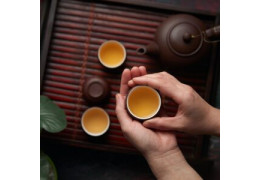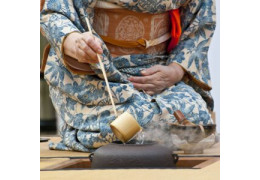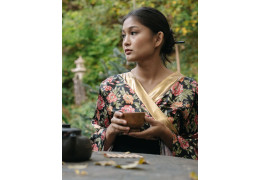Hojicha, Genmaicha and Gyokuro: 3 green teas from Japan
Like China, tea culture is deeply rooted in Japan. Various types of Japanese green tea have been produced since the 15th century. In France, the best-known are Sencha, Bancha and Matcha powder. But there is also a roasted tea (Hojicha), a tea mixed with rice grains (Genmaicha) and a quality shade tea (Gyokuro). Focus on these Japanese teas.
Hojicha: roasted green teas
Hojicha means "roasted tea" in Japanese. Hojicha tea first appeared in Kyoto around 1920. Today, its consumption is very popular in Japan. It is made from several green teas: Bancha, Sencha and Kukicha.
Japanese roasted tea production
Hojicha tea is obtained by roasting. After harvesting, the tea leaves are roasted at a temperature of 200°C. Hojicha tea is produced from three types of Japanese tea.
- Bancha, a medium-quality tea (leaves from the latest harvest).
- Sencha, superior quality(leaves from the first harvest).
- Kukicha, ground tea stems containing no caffeine.
Brewing and tasting Hojicha
We recommend water between 70 and 85°C for infusing Hojicha tea. One cup requires 3 grams of product. An infusion of around 30 seconds is enough to reveal the tea's toasty, vegetal taste. There are woody and fruity aromas, as well as vanilla and caramel. Some even detect a hint of sweet tobacco. Roasted tea is widely consumed in Japan, particularly in sushi restaurants. Hojicha goes wonderfully well with fish.
Benefits of drinking Hojicha
Roasting changes the characteristics of the tea leaves. Japanese Hojicha teas are low in caffeine (or even caffeine-free in the case of Kukicha). They can therefore be drunk in the evening. The infusion is also low in tannins. This low-astringency beverage is therefore suitable for sensitive stomachs and children.
Genmaicha: green tea with toasted rice
Among Japanese teas, Genmaicha stands out for its composition: green tea leaves and roasted rice grains. As the rice can burst, this product of Japanese culture has earned the nickname"popcorn tea".
Origins of green tea with rice
Legend has it that a clumsy servant accidentally invented Genmaicha in the 15th century. In reality, consumption of green rice tea gradually became more widespread among the Japanese working class. Indeed, the price or scarcity of Japanese teas in certain regions made the product difficult to access. So the Japanese got into the habit of adding toasted rice to the leaves, to use the tea sparingly.
Tasting Genmaicha teas
To prepare Genmaicha green teas, a short infusion is made in water heated to 80°C. The tea, with its light yellow color, exudes freshness and sweetness. It has notes of malt and caramelized hazelnuts. Its characteristic taste is reminiscent of roasted coffee. The rice offers gentle aromas that erase the astringency of Japanese green tea. Its warm flavor is a perfect match for sweet-and-sour cuisine. In Japan, Genmaicha is widely enjoyed with meals.
Genmaicha: variations on the Japanese drink
Genmaicha is also produced from a variety of Japanese teas. Bencha, Sencha or Kukicha leaves are blended with roasted rice. There's also a Hojicha Genmaicha, a combination of roasted green tea leaves and rice. Another beverage, Matcha-iri Genmaicha, is obtained by blending Matcha powder into a classic Genmaicha. The quality of Genmaicha depends not only on the tea leaves used, but also on the variety of rice selected.
Gyokuro: tea for Japanese ceremonies
Created in Uji, Gyokuro is one of Japan's great teas. With its umami taste, it has conquered the whole of Japan. It is particularly appreciated during the tea ceremony.
Producing and harvesting Gyokuro
Gyokuro is a Japanese shade tea. It comes from a special cultivation of tea bushes. Two to three weeks before the leaves are harvested, the trees are covered. Deprived of 90% of light, the leaves are loaded with caffeine and chlorophyll. It's this very special cultivation that gives the leaves their beautiful color and the sweet taste of the infusion. Gyokuro tea is produced in Uji, Shizuoka and Kagoshima. It's a very rare tea, and commands a higher price than conventional teas. Other Japanese teas, such as Matcha and Kabusecha, are grown in the shade.
Taste of Japanese ceremonial tea
Gyokuro Japanese teas are of the highest quality. Highly esteemed in Japan, they are reserved for special occasions and tea ceremonies. The cultivation of the tea plant makes the leaves rich in caffeine and low in tannin. As a result, the flavor is very mild, close to umami according to the Japanese. After a few minutes' infusion, Gyokuro offers fresh, intense notes. On the palate, there's a distinctive taste of blue-green algae. Would you like to discover the taste of the best Japanese teas? At Thés & Traditions, we offer Sencha, Genmaicha, Hojicha and Gyokuro leaves, as well as Matcha powder. Discover our other products, too: quality organic tea, herbal teas, coffee and accessories.




